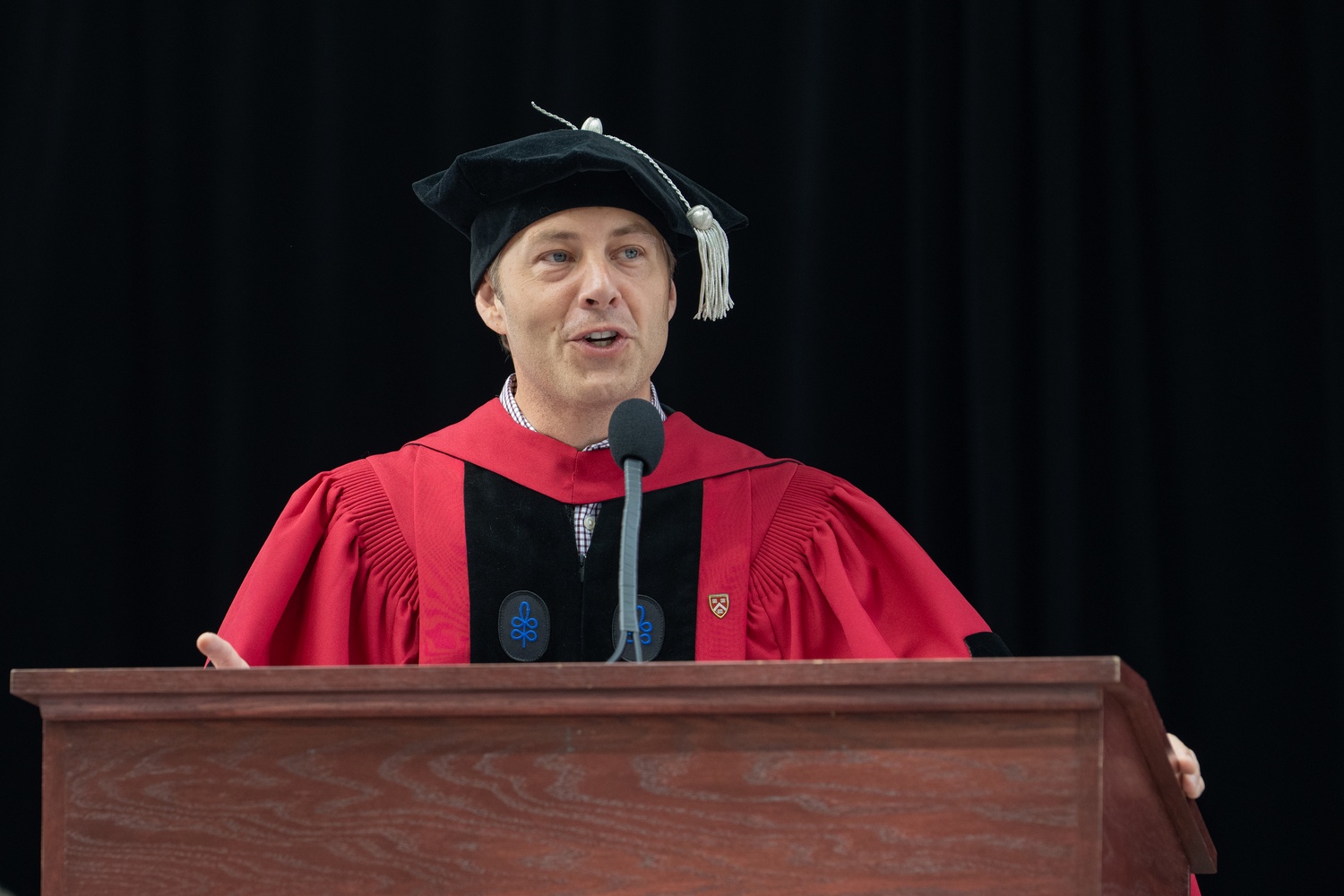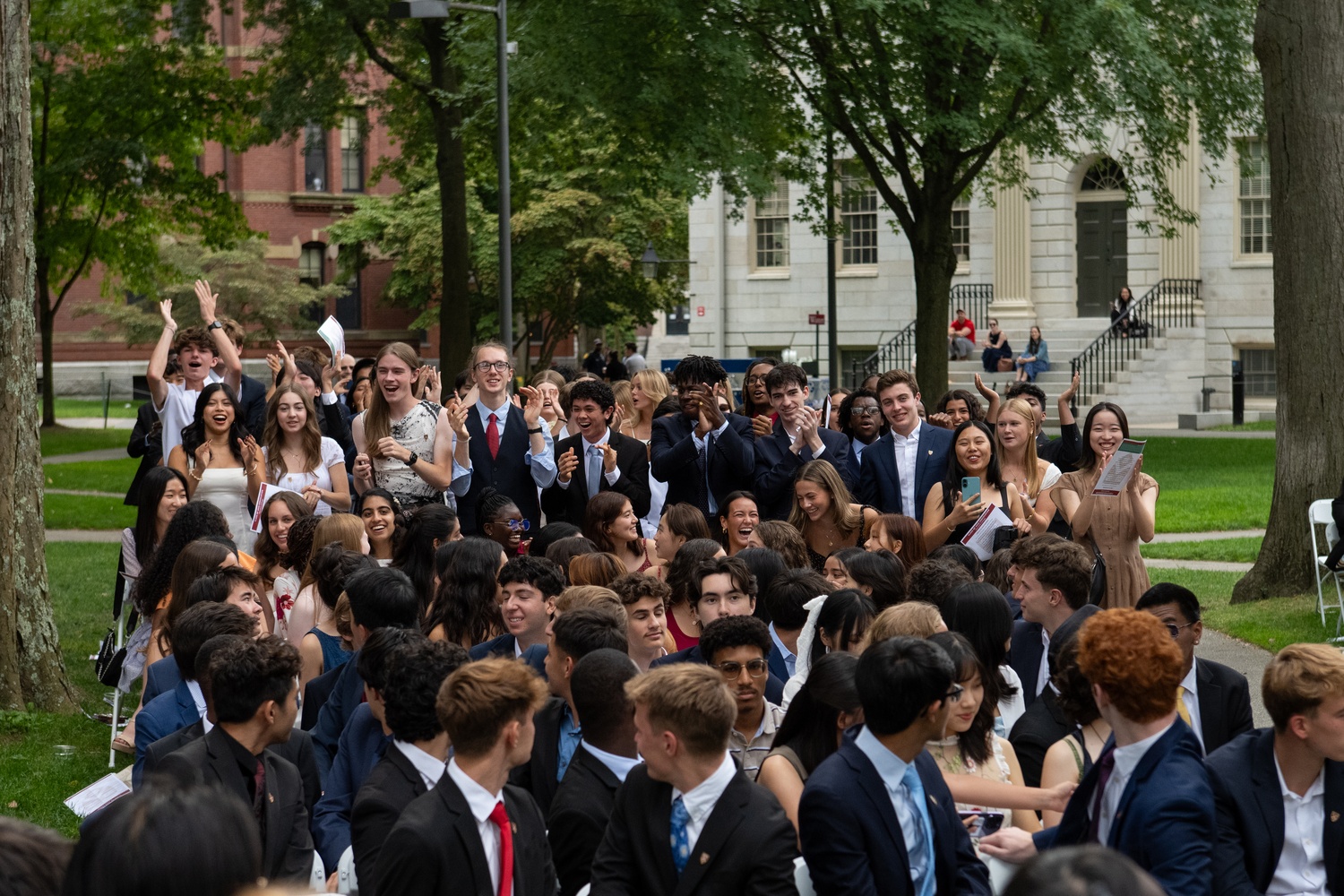
News
Summers Will Not Finish Semester of Teaching as Harvard Investigates Epstein Ties

News
Harvard College Students Report Favoring Divestment from Israel in HUA Survey

News
‘He Should Resign’: Harvard Undergrads Take Hard Line Against Summers Over Epstein Scandal

News
Harvard To Launch New Investigation Into Epstein’s Ties to Summers, Other University Affiliates

News
Harvard Students To Vote on Divestment From Israel in Inaugural HUA Election Survey
At Harvard Convocation, College Dean David Deming Tells Freshmen to Prepare for AI Age

In his inaugural convocation address, Harvard College Dean David J. Deming told incoming freshmen they were living through a “unique moment in history” — though not focusing on reasons members of the audience had anticipated.
“We’re living in a time of uncertainty and fear about the future, and those fears extend far beyond these gates,” he said. “There’s a broader sense of foreboding in the air about the value of education in an age of artificial intelligence.”
Deming, a labor economist at the Harvard Kennedy School who was promoted to College dean in July, opted not to mention the University’s ongoing battle with the Trump administration over billions in research funding and threats against international students. Instead, he spent his 10-minute speech arguing Harvard would arm students to survive — and rise to the top — in an AI-driven world.
“While there’s a decent chance your dream job at a steady company will one day be downsized or disrupted, there’s also a good chance that some of the founders of the top 10 companies in 2050 are sitting in the audience right now,” he said.
Though Deming warned that large companies are hiring less, he encouraged students to explore new paths and take advantage of industry “disruption.”
“I predict that an AI infused economy will make a liberal arts and sciences education more valuable,” he said. “One of the most important skills you learn here is the ability to adapt to a changing world — and change is unavoidable.”
Deming’s focus on post-graduate outcomes for Harvard students stood in stark contrast to speeches given by his predecessor, former College Dean Rakesh Khurana. In Khurana’s first Convocation address in 2014, he encouraged freshmen to avoid focusing on “material goals,” and instead treat College as a “transformative experience.”

Listening to Deming with fellow freshmen, Lily H. Dagenais ’29 and Abby V. Ives ’29 said his pivot to AI caught them by surprise, though they were not expecting the new dean to delve into Harvard’s political battles.
“That part dragged a little bit,” Ives said. “But I think it’s a good message overall.”
“It’s very repetitive of what we’ve been hearing a lot lately, instead of talking about things that could matter a little bit more,” Dagenais said.
Harvard President Alan M. Garber ’76 also addressed the class, though initially by the wrong label.
“Hello, members of the Harvard College Class of 1929,” Garber said.
“I’m afraid I’ll show my age very often,” he added after realizing the mistake. He went on to explain how his undergraduate journey at Harvard was enriched by peers he did not immediately think would be his friends.
Though he did not provide an update on Harvard’s settlement negotiations with the White House or its lawsuit over federal funding — on which a judge is expected to rule within days — he addressed the administration’s attempts to prevent international enrollment.
“I know some of you worried that you would not be able to make the journey here, would not be able to become part of our community,” he said. “We are so glad to see you. Harvard would not be Harvard if it did not include inquisitive, ambitious students from across the United States and around the world.”
During the program, a handful of students held banners on either side of the Memorial Church stage calling on Harvard to divest from Israel. Some protesters also handed out fake convocation programs, which argued that Harvard has colluded with the government by making several of Trump’s demanded changes, despite administrators’ public insistence otherwise.
Over the summer, Harvard closed offices for racial minorities, women, and LGBTQ students and removed first-generation and LGBTQ residential adviser roles. They also introduced a new antisemitism training for pre-orientation student leaders and residential life staff last month, facing criticism from students for not including any comparable training on racism or Islamophobia.
Simon M. Karpinski ’29, another freshman attendee, said that in the face of intense public scrutiny and two high-stakes legal battles, the messages from Garber and Deming were “fantastic.”
“It really gave me a lot of hope for the future, a lot of hope for the people I’m going to be around for the next couple of years, and a desire, honestly, to get to know as many of these future world leaders as I can,” he said.
—Staff writer Samuel A. Church can be reached at samuel.church@thecrimson.com. Follow him on X @samuelachurch.
—Staff writer Cam N. Srivastava can be reached at cam.srivastava@thecrimson.com. Follow him on X @camsrivastava.
Want to keep up with breaking news? Subscribe to our email newsletter.
